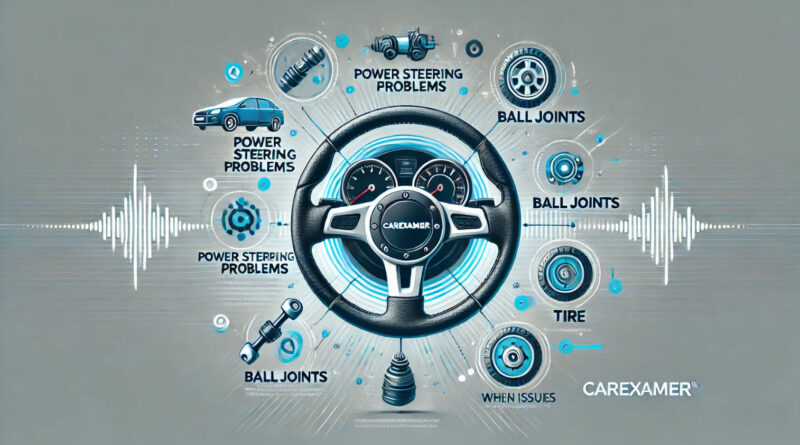Steering Wheel Noise When Turning? Common Causes
In this guide, we’ll break down some of the common reasons why your car might gave steering wheel noise when turning, and what you can do to fix it. Hearing strange noises when you turn your steering wheel can be frustrating and a little worrying. Whether it’s a squeal, clunk, or groan, these sounds are often signs that something’s up with your car’s steering, suspension, or another key part.
1. Low Power Steering Fluid
One of the most common reasons for noise when you turn the wheel is low power steering fluid. Your car needs this fluid to help you steer smoothly. Without enough of it, you might hear a whining or groaning sound as the system struggles to function.
What It Sounds Like:
- A whining or groaning sound, especially when turning at low speeds.
What to Do:
- Check the power steering fluid and top it off if it’s low. If the problem keeps happening, you could have a leak that needs fixing.
2. Worn or Faulty Power Steering Pump
Your power steering pump is what keeps that fluid moving, making it easier to turn the wheel. If the pump is worn out, it’ll struggle and make a squealing or groaning noise when you turn.
What It Sounds Like:
- A squealing or groaning sound, mostly at slow speeds or when parking.
What to Do:
- Get your power steering pump checked. If it’s the problem, you’ll need to replace it.
3. Loose or Damaged Steering Column
The steering column connects your steering wheel to the rest of the system. If something’s loose or damaged, it can make clunking or knocking noises when you turn.
What It Sounds Like:
- A clunking or knocking noise when you turn the wheel.
What to Do:
- Have a mechanic inspect the steering column. Tightening or lubricating parts might fix the issue, but in some cases, you’ll need to replace worn components.
4. Worn Ball Joints
Your car’s ball joints are part of the suspension system, and they help the wheels move smoothly. Over time, these joints can wear out, causing popping or clunking noises when you turn.
What It Sounds Like:
- A popping or clunking noise when turning, especially at low speeds or over bumps.
What to Do:
- If you suspect the ball joints are worn, get them checked out. Replacing them is important for both smooth steering and safety.
5. Suspension Issues
Your car’s suspension system – including parts like tie rods, bushings, and struts – helps absorb bumps and keep your ride smooth. If any of these parts are worn out, you might hear creaking, clunking, or grinding noises when you turn the wheel.
What It Sounds Like:
- Creaking, clunking, or grinding when turning, especially on uneven surfaces.
What to Do:
- Get the suspension inspected. Worn bushings, tie rods, or other components may need replacing.
6. Dry Steering Column Bearings
The steering column bearings help your wheel turn smoothly. If they get dry or worn out, you might hear a rubbing or grinding noise when turning the wheel.
What It Sounds Like:
- A rubbing or grinding noise when you turn the steering wheel.
What to Do:
- Try lubricating the bearings. If they’re too worn, they’ll need to be replaced.
7. Tire or Alignment Problems
Sometimes, the issue isn’t with the steering or suspension – it’s with your tires or wheel alignment. If your wheels are misaligned or your tires are unevenly worn, you might hear squealing or screeching sounds when turning.
What It Sounds Like:
- A squealing or screeching noise, especially when turning at higher speeds.
What to Do:
- Check your tire pressure and make sure your tires are wearing evenly. If the problem persists, you may need a wheel alignment.
8. Worn Steering Rack
The steering rack is a key part of your car’s steering system. If it’s worn or damaged, you might hear clunking or knocking when turning. It’s more common in older cars, but steering racks can wear out over time.
What It Sounds Like:
- A clunking or knocking noise, often paired with stiff steering.
What to Do:
- If the steering rack is worn out, it’ll need to be repaired or replaced. Have a mechanic check it out.
9. Tire Rubbing
If your tires are too large or not the right fit for your car, they could be rubbing against the wheel well or other parts when you turn. This usually happens during tight turns.
What It Sounds Like:
- A rubbing sound during sharp turns.
What to Do:
- Check your tire size and make sure they’re fitted properly. You may need smaller tires or wheel spacers to fix the issue.
10. Bad Wheel Bearings
Wheel bearings help your wheels rotate smoothly, and if they’re worn out, you might hear humming or grinding when you turn the wheel.
What It Sounds Like:
- A humming or grinding noise, usually when turning at higher speeds.
What to Do:
- Worn wheel bearings should be replaced right away to avoid more serious damage and ensure safe driving.
Wrapping It Up
If you’re hearing noises when turning your steering wheel, don’t ignore it. Whether it’s something as simple as low power steering fluid or a more complex issue like worn ball joints, addressing the problem early can save you from bigger headaches later on. If you’re not sure what’s causing the noise, it’s always a good idea to get a mechanic to take a look and get things fixed before they become a serious safety risk. Buying a used car is a smart way to save money – but only if you buy the right car. Take your time, inspect everything, and when in doubt, get a professional pre purchase car inspection.

